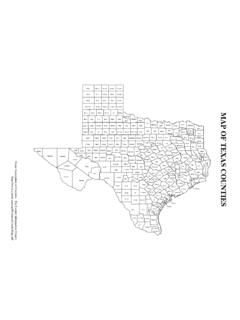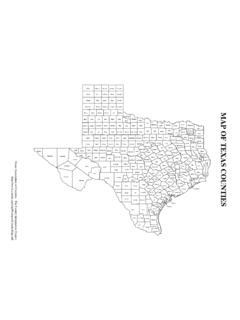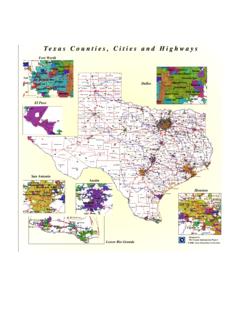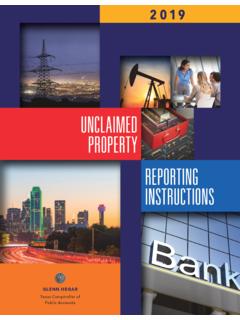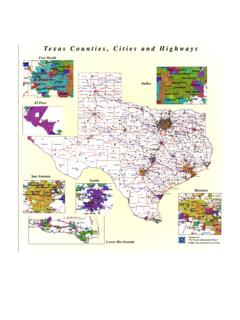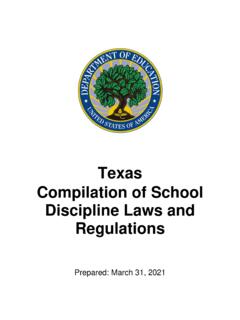Transcription of 2018 GUIDE TO TEXAS LAWS FOR COUNTY OFFICIALS TEXAS ...
1 2018. GUIDE TO TEXAS LAWS. FOR COUNTY OFFICIALS . TEXAS ASSOCIATION OF COUNTIES. 1210 San Antonio Street, Austin, TEXAS 78701. Honorable Larry Gallardo Hidalgo COUNTY Constable & Association President Gene Terry Executive Director Rex Hall Assistant Executive Director PREPARED BY DAVID B. BROOKS. BOX 12303. CAPITOL STATION. AUSTIN, TEXAS 78711. THIS PUBLICATION IS A RESEARCH TOOL AND NOT THE COUNSEL OF AN ATTORNEY. THIS. PUBLICATION IS NOT A SUBSTITUTE FOR THE ADVICE OF AN ATTORNEY. It is provided without warranty of any kind and, as with any research tool, should be double checked against relevant statutes, case law, attorney general opinions and advice of legal counsel , your COUNTY attorney.
2 Each public officer is responsible for determining duties of the office or position held. Any question regarding such duties should be directed to competent legal counsel for a written opinion. TABLE OF CONTENTS. INTRODUCTION .. 1. COUNTY COMMISSIONERS COURT .. 3. Overview .. 4. 1. Roads and Bridges .. 5. 2. Personnel .. 10. 3. Offices, Boards and Commissions .. 15. 4. Operating Facilities .. 16. 5. Bonding 19. 6. Contracting Authority .. 24. 7. Elections .. 30. 8. Regulatory Responsibilities .. 33. 9. Fiscal Operation .. 39. 10. Public Health and Welfare .. 43. 11. Administrative Duties .. 50. 12. Judicial 54. 13. Public Works .. 56. 14. Juveniles .. 61. COUNTY JUDGE.
3 63. Overview .. 64. 1. Description of 65. 2. Elections .. 65. 3. Financial Responsibilities .. 66. 4. Personal Bonds and Sureties .. 68. 5. Administration of COUNTY Court .. 68. 6. Mental Health .. 69. 7. Special 70. 8. General Administrative 71. iii COUNTY TAX ASSESSOR-COLLECTOR .. 73. Overview .. 74. 1. Description of 75. 2. Calculation of Taxes .. 75. 3. General Law Districts .. 77. 4. Motor Vehicle 77. 5. Voter Registration .. 78. 6. Taxing and Financial Responsibilities .. 78. 7. Operation of Office .. 79. 8. Collection and Reporting of Taxes 80. 9. Tax Delinquency, Deferred Payments, Seizure of Property .. 81. 10. Postappeal Administrative Procedures .. 82. 11.
4 Miscellaneous .. 82. COUNTY 84. Overview .. 85. 1. Description of 86. 2. Elections .. 86. 3. Recording Duties .. 88. 4. Financial Records .. 92. 5. Administrative Duties .. 95. 6. Miscellaneous .. 97. COUNTY TREASURER .. 98. Overview .. 99. 1. Description of 100. 2. Responsibility for Monies Collected .. 100. 3. Disbursement of Funds .. 102. 4. Recordkeeping and Reporting .. 103. DISTRICT CLERK .. 105. Overview .. 106. 1. Description of 107. 2. 107. 3. Financial 108. 4. Administrative Duties .. 109. iv SHERIFF .. 111. Overview .. 112. 1. Description of 113. 2. Law Enforcement and Judicial Policy .. 114. 3. Personnel 116. 4. State Agencies .. 116. 5. Fees, Compensation, and Financial Transactions.
5 117. 6. Payment of Debts and Seizure of Property .. 119. 7. General Welfare .. 120. 8. Service of Process and Notices .. 120. JUSTICE OF THE peace .. 123. Overview .. 124. 1. Judicial Responsibilities .. 125. 2. Miscellaneous Judicial Duties .. 127. 3. Description of Office and Regulation of Justice 129. 4. Financial Duties and Transactions .. 130. CONSTABLE .. 132. Overview .. 133. 1. Description of 134. 2. Service of Process .. 134. 3. Law Enforcement 136. 4. Personnel 137. 5. State Agencies .. 138. 6. Recordkeeping, Compensation and Financial 139. COUNTY ATTORNEY .. 141. Overview .. 142. 1. Description of 143. 2. Administrative and Advisory Duties .. 144. DISTRICT ATTORNEY.
6 147. Overview .. 148. 1. Description of 149. 2. Administrative Duties .. 150. v COUNTY AUDITOR .. 153. Overview .. 154. 1. Description of 155. 2. Financial Operation of COUNTY Offices .. 155. 3. 157. 4. Supervision of Improvement Districts .. 158. 5. Miscellaneous Budget-related Duties .. 158. COUNTY SURVEYOR .. 159. Overview .. 160. 1. Description of 161. 2. Examination and Recording of Surveys and Records .. 161. vi INTRODUCTION. PURPOSE OF THE GUIDE . The statutory duties and responsibilities of COUNTY government OFFICIALS in TEXAS are numerous. They range from mandatory requirements pertaining to essential public functions to optional authority to carry out discretionary activities.
7 Responsibilities of COUNTY OFFICIALS are found throughout the TEXAS Constitution, TEXAS Revised Civil Statutes Annotated, and the various codes, including the Local Government Code, Agriculture Code, Election Code, Government Code, Natural Resources Code, Family Code, Tax Code, Parks and Wildlife Code, Water Code, and Business and Commerce Code. Some applicable laws were enacted before 1900. However, many statutory responsibilities have been added or redefined during recent legislative sessions. This GUIDE is a compilation of current statutes affecting the administration and operation of the principal COUNTY offices. While the compilation informs COUNTY OFFICIALS about the more important statutes affecting their offices, it is primarily intended to provide them with a convenient reference source for questions regarding the scope of their individual duties.
8 While most of the referenced statutes apply to OFFICIALS of all counties, actual COUNTY operations vary according to population, geographic location, and other factors. For example, larger counties may provide a broader range of programs pertaining to human resources and economic development. Also, counties along the Gulf Coast have some powers not granted to other counties. Thus, COUNTY OFFICIALS in some counties have responsibilities that their counterparts in other counties do not have. FOCUS OF THE GUIDE . While this GUIDE is comprehensive, it does not list every statute that may affect COUNTY government. The document is intended primarily as a quick reference GUIDE for COUNTY OFFICIALS .
9 Its main focus is a description of the office and the administrative duties associated with it. Therefore, the statutes included are those directed at the particular COUNTY official, or which enunciate a distinct duty, responsibility, or condition affecting the office. Financial, personnel, public welfare, and ministerial responsibilities were emphasized. Statutes that were not generally included were those pertaining to criminal law enforcement and the judiciary. (An exception was made for the justice of the peace , since the main duties of this officer are judicial in nature.) Therefore, statutory responsibilities and laws affecting COUNTY offices listed in the Penal Code, Code of Criminal Procedure, and Rules of Civil Procedure are generally not included.
10 1. Introduction Page 2. Also, population bracket laws that apply only to counties in a specific population category were generally not included. For each office, the various duties were divided into general categories, indicated by descriptive sentences. Then, categories were separated by subject groupings, indicated by spacing. Similar statutes relating to different COUNTY officers were not always located under the same category. Some categories were combined for the sake of brevity. The approach was to identify a function or responsibility, not to record the statute in total. Consequently, the statutes were summarized as briefly as possible. Mandatory duties were summarized as briefly as possible.
